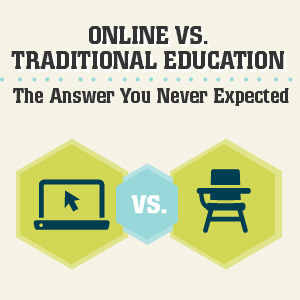Acquiring a degree path that’s right for you,whether it is via online or traditional education, is a big decision for many—and not something to be taken lightly.
As employers demand more skills from employees, the demand of online degree programs has increased in popularity. Traditional education, on the other hand, is still being commonly utilized.
“Each student learns differently and in today’s era of increasing technology, the question will not be whether to offer classes online, but rather how to implement them,”
There are several options when it comes to online or traditional education degrees. The platform offers everything from certificates and diplomas to more advanced degree options such as an associate or bachelor’s degree.
With constant changes in technology from all different degree programs, let’s take a look at the advantages to an online versus traditional education and examine how each type of education impacts you as a student.
Flexibility
One of the key components to consider when weighing the options is the amount of time you have everyday to work on your degree.
Online education:
A benefit to taking online courses is that they offer flexibility to the student. This is a great option for those who already have a time commitment with family and work. Online classes will fit your schedule—log in to your online course at a time that works best for you as opposed to having to attend a lecture at a specific time.
Traditional education:
This option is best for those who have a little more time in their schedule. Even if you’re hoping for a little flexibility, on-campus courses typically offer day and evening schedules so you can coordinate with your daily commitments. One thing you’ll need to remember to factor in is where you live
Discipline
Something else to consider while weighing your college options is how much you can discipline yourself.
Online education:
Being an online student will work well for those who have the ability to self-motivate. Without a plan or some type of organization, your work will suffer in the online classroom, but if you set deadlines and prioritize your school schedule, you should see success.
Traditional education:
A traditional on-campus setting is probably best for you, if you know you need discipline to get work completed. This method will give you the support and will to complete assignments and tasks on a daily basis.
Social Interaction
One final area to consider is if you need a classroom experience that provides one-on-one communication for success.
Online education:
Interactions with instructors and peers will still happen as an online student. It just happens to be through online video instead. Learning through online video can help you to focus more on independently learning and your classes may even go quicker without some of the distractions of a traditional classroom education.
Traditional education:
Traditional education is better for those who need face-to-face communication. When you don’t have direct interactions with your instructors, you may tend to do not as well with the work you already have. If this is the case for you, success will come with a traditional education setting.
The Blended Education Model
At this point, you might be thinking there are pros and cons to both online and traditional education.
Blended education combines the intimacy and face-to-face interaction of a physical classroom with the flexibility and convenience of an online one.
Schools like the blended model because it provides students with cutting-edge artificially intelligent tutoring software while allowing instructors flexibility in planning their syllabuses. Students appreciate the blended model because it offers a reprieve from dusty textbooks and mundane human lectures.
It’s clear there are many options for earning your degree. The new trend in blended education in schools across the country might just be coming to a college near you.
